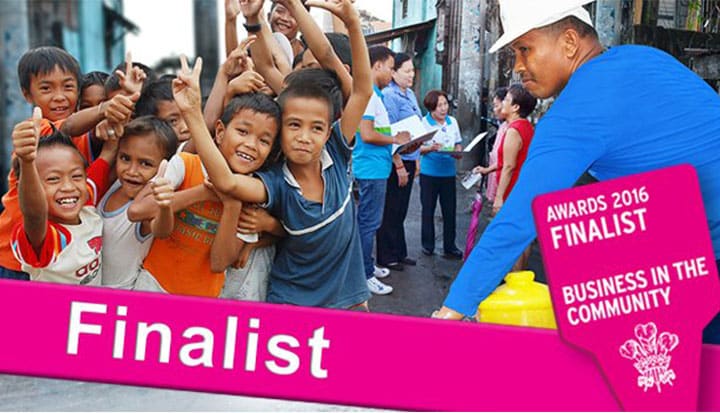Manila Water Company is a Finalist in the Unilever Global Development Award supported by Business Fights Poverty.
We asked them some questions about their programme and the global development impacts achieved.
Q) What challenge does Manila Water Company serve to change?
Poor access to water leads to major health risks such as diarrhoea and other water-borne diseases, poor personal and community sanitation, higher expense from private delivery for questionable water quality and considerable time wasted queuing for water.
Prior to the initiation of our Tubig Para sa Barangay (TPSB – Water for the Poor) programme, urban poor families, which are usually informal settlers with low incomes in the East Zone of Metro Manila and Rizal Province, did not have access to a safe water supply due to stringent requirements applying for a service connection, such as proof of property ownership and right-of-way for water service connections. The cost of individual water service connection is far beyond the earning capacity of many families.
When water and used water services in Metro Manila were privatised in 1997, companies including Manila Water were faced very old water and used water infrastructure with large system losses through leaks and illegal connections. These illegal connections also led to a greater potential contamination of water for other water users.
Manila Water, launched TPSB to provide innovative solutions to give access to clean, potable and affordable water to these marginalized communities.
Q) How has Manila Water Company approached creating this change?
At Manila Water, we aim to supply water to marginalized communities to ensure that everyone has access to clean, drinkable and affordable water. Before laying pipes and installing meters, our Manila Water teams conduct consultation with the community members and local government officials. Issues such as right-of-way, narrow roads, and clustered dwelling spaces were addressed through the programme. With the support of our local government units and financial partners, beneficiaries of the programme pay just a third of the cost of the regular connection in instalments.
More than 700 projects have been completed through the programme, resulting in greater access to a clean, safe water supply 24/7 for more than 1.8 million people. The programme is now being replicated in our subsidiaries in other key cities in the Philippines and there is now a parallel focus on sewerage and sanitation programmes as well as a community education programme about river water pollution.
Q) What has the community reaction been?
Since communities are consulted about the solution to their water problems and are encouraged to participate from the planning, implementation and monitoring of the programme, their sense of ownership and responsibility for their water connections is heightened, ensuring their help in maintaining the facilities and connections. In this way, the programme has enabled Manila Water to develop stronger ties with their customer communities, giving rise to a new customer relations initiative called Kasangga, which loosely translates as “Partners or Advocates”.
Today, community officials and residents join forces in keeping custody of their water meters and connections, making sure that they are free from illegal connections and leakages while ensuring that the residents are up to date in their payments. Any problems concerning their water services are immediately relayed to Manila Water teams for immediate resolution.
Overall households are making an 80% saving on the costs they were paying for poor quality water that was sold to the community through water delivery services. The time previously spent queueing for water can now be used for more productive pursuit. More importantly, it is restoring the dignity of the individual that provides greatest impact to the marginalized communities.
“More families are now enjoying 24 hour supply of clean, potable and safe water. Water-related illnesses have also been eliminated, and people could now fund small merchandise or businesses which could help them increase their source of income. The residents need not walk long distances to fetch water from their neighboring communities. Instead, they can now enjoy 24-hour supply of clean, potable and AFFORDABLE water.” Beneficiary of the TPSB programme
What Manila Water’s CEO said:
“The Tubig Para Sa Barangay (Water for the Poor) Program enabled us in the last 17 years to add 3.2 million customers to the base that we had at the start of the concession. More than half of which are from the lower income group. If that did not happen, then I don’t think we could sustain our business both from an economic point of view, as well as from a social, community and regulatory point of view. So it’s triple bottomline.”
Gerardo C. Ablaza, Jr, President and CEO
The Unilever Global Development Award winner will be announced at the Annual Responsible Business Gala on 11 July. For live updates from the winners please follow#BITCawards.
For more information about the Business in the Community Awards please see










